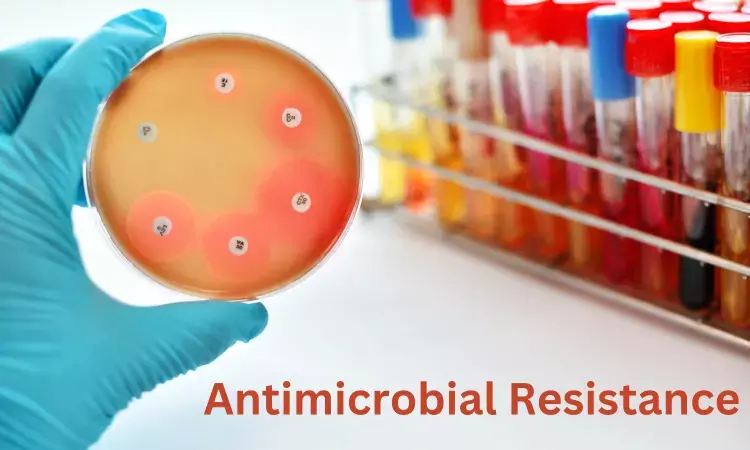- Home
- Medical news & Guidelines
- Anesthesiology
- Cardiology and CTVS
- Critical Care
- Dentistry
- Dermatology
- Diabetes and Endocrinology
- ENT
- Gastroenterology
- Medicine
- Nephrology
- Neurology
- Obstretics-Gynaecology
- Oncology
- Ophthalmology
- Orthopaedics
- Pediatrics-Neonatology
- Psychiatry
- Pulmonology
- Radiology
- Surgery
- Urology
- Laboratory Medicine
- Diet
- Nursing
- Paramedical
- Physiotherapy
- Health news
- Fact Check
- Bone Health Fact Check
- Brain Health Fact Check
- Cancer Related Fact Check
- Child Care Fact Check
- Dental and oral health fact check
- Diabetes and metabolic health fact check
- Diet and Nutrition Fact Check
- Eye and ENT Care Fact Check
- Fitness fact check
- Gut health fact check
- Heart health fact check
- Kidney health fact check
- Medical education fact check
- Men's health fact check
- Respiratory fact check
- Skin and hair care fact check
- Vaccine and Immunization fact check
- Women's health fact check
- AYUSH
- State News
- Andaman and Nicobar Islands
- Andhra Pradesh
- Arunachal Pradesh
- Assam
- Bihar
- Chandigarh
- Chattisgarh
- Dadra and Nagar Haveli
- Daman and Diu
- Delhi
- Goa
- Gujarat
- Haryana
- Himachal Pradesh
- Jammu & Kashmir
- Jharkhand
- Karnataka
- Kerala
- Ladakh
- Lakshadweep
- Madhya Pradesh
- Maharashtra
- Manipur
- Meghalaya
- Mizoram
- Nagaland
- Odisha
- Puducherry
- Punjab
- Rajasthan
- Sikkim
- Tamil Nadu
- Telangana
- Tripura
- Uttar Pradesh
- Uttrakhand
- West Bengal
- Medical Education
- Industry
Indian Study Points to Growing Antimicrobial Resistance in Critical Care, Calls for Immediate Action

Antimicrobial Resistance
India: A recent review published online in Medical Journal Armed Forces India (MJAFI) highlights the alarming rise of antimicrobial resistance (AMR) in intensive care units (ICUs), where patients are often vulnerable due to underlying conditions and the invasive procedures they undergo. The review stressed the necessity of a multifaceted strategy to maintain the effectiveness of critical care interventions.
The study's lead author Dr. Raju Vaishya, Professor & Senior Consultant Orthopaedic Surgeon, Indraprastha Apollo Hospitals, Sarita Vihar, New Delhi, India, shared important insights with Medical Dialogues regarding the rising threat of antimicrobial resistance in critical care environments. He stated, "The major takeaway from this review is that AMR is a growing threat in critical care settings, primarily due to the misuse of antibiotics. This misuse leads to the development of 'superbugs' – bacteria resistant to traditional antibiotics. AMR has serious consequences, including increased costs, longer hospital stays, and limited treatment options for critically ill patients."
Dr. Vaishya further emphasized the need for a comprehensive approach to combat AMR, which includes:
- Antibiotic Stewardship: Using antibiotics only when necessary and in the correct manner.
- Research and Development: Creating new classes of antibiotics and alternative therapies.
- Infection Control Measures: Preventing the spread of resistant bacteria through hygiene and sanitation practices.
- Public Education: Raising awareness about the dangers of AMR and the significance of responsible antibiotic use.
- Collaboration: Engaging various sectors (healthcare, research, policy) to formulate and execute effective strategies.
He also highlighted the urgent need for a paradigm shift towards responsible antibiotic usage, innovation in antimicrobials, and stringent infection control practices.
The inappropriate use of antibiotics has contributed to the rise of AMR, posing a significant threat to critically ill patients who depend on these treatments. This research examined the challenges posed by superbugs and AMR in critical care environments while outlining potential solutions.
The narrative review used keywords like “antimicrobial resistance” and “superbugs” in PubMed, Scopus, and Google Scholar databases. Based on the review: the following inferences were made:
- The overuse and misprescription of antibiotics contribute to the development of superbugs, rendering traditional treatments ineffective in critical care.
- AMR in critical care leads to increased costs, extended hospital stays, and limited treatment options.
- Combating AMR requires a multifaceted approach, including antibiotic stewardship, research, and development of novel antibiotics and alternative therapies, and rigorous infection control measures.
- Public education and collaboration among stakeholders are crucial for effective strategies.
- Future success hinges on a paradigm shift toward antibiotic stewardship, innovation in antimicrobials, and infection control. Implementing legislation and antimicrobial stewardship (AMS) programs are necessary steps.
- Research gaps exist in understanding environmental factors influencing AMR.
- New classes of antibiotics, faster diagnostics, and optimized drug combinations are future directions.
- Global collaboration in research, surveillance, and policy development is paramount.
Dr. Vaishya provided important context regarding the limitations of the review, stating, "This is a narrative review and not an original study based on patient data. It does not address specific interventions or their effectiveness."
"This review provides a comprehensive overview of the challenges and potential solutions for AMR in critical care settings. It emphasizes the importance of a multifaceted approach and collaboration among different stakeholders," he concluded.
Dr. Vaishya suggests future research should explore environmental factors, develop new antibiotics, optimize drug combinations, and enhance public education on AMR.
Reference:
Puri B, Vaishya R, Vaish A. Antimicrobial resistance: Current challenges and future directions. Med J Armed Forces India 2024: https://doi.org/10.1016/j.mjafi.2024.07.006
Dr Kamal Kant Kohli-MBBS, DTCD- a chest specialist with more than 30 years of practice and a flair for writing clinical articles, Dr Kamal Kant Kohli joined Medical Dialogues as a Chief Editor of Medical News. Besides writing articles, as an editor, he proofreads and verifies all the medical content published on Medical Dialogues including those coming from journals, studies,medical conferences,guidelines etc. Email: drkohli@medicaldialogues.in. Contact no. 011-43720751


